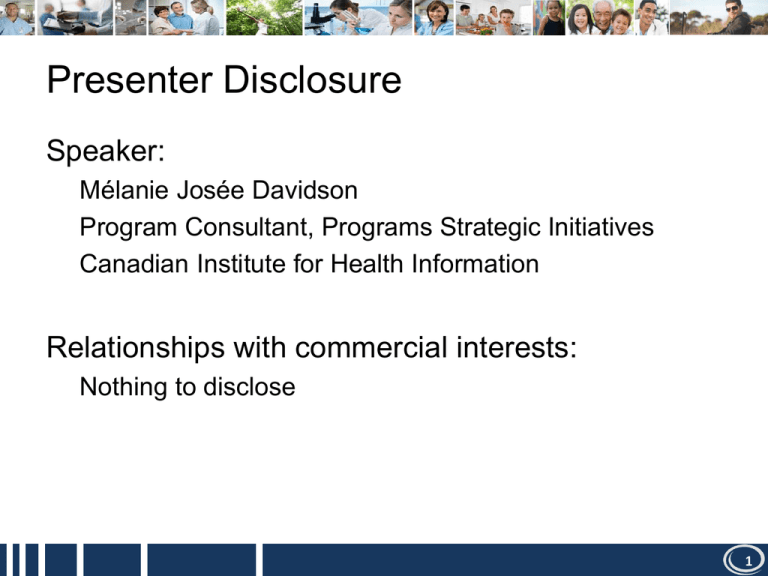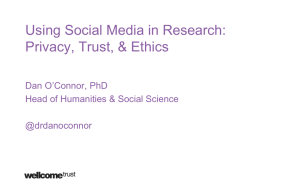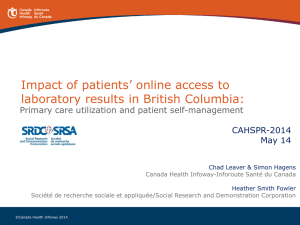Better Information for Improved Health - e
advertisement

Presenter Disclosure Speaker: Mélanie Josée Davidson Program Consultant, Programs Strategic Initiatives Canadian Institute for Health Information Relationships with commercial interests: Nothing to disclose 1 Better Information for Improved Health: A Vision for Health System Use of Data in Canada May 2013 Canadian Institute for Health Information, in collaboration with Canada Health Infoway, on behalf of the Conference of Deputy Ministers of Health Outline • • • • • • Introduction Drivers for action Use, value and benefits Building blocks Guiding principles Call to action 3 INTRODUCTION 4 Introduction • Health system use of data • Unique opportunity created by transition to electronic records 5 Privacy and Confidentiality • Personal health information is not just data • Health information privacy laws: – Govern the collection, use, management and disclosure of personal health information – Generally permit secondary use of health data (paper or electronic) for management and planning of the health system • Privacy-by-design principles and technological advances for consent management and deidentification 6 Drivers for Action 1. Growth of digitized data 2. Technological advances 3. Sustainability and performance 4. Shifting expectations 7 Shifting Expectations • 70% of Canadians support sharing their health records for health system uses • 75%+ comfortable sharing their information with other health organizations and for research • 80%+ not comfortable sharing their information with private and for-profit organizations 8 USE, VALUE & BENEFITS • • • • Patients and families Clinicians and care providers Policy-makers and administrators Health System 9 Areas of Use Clinical settings: – quality improvement initiatives – effectiveness of front-line care – decision support Health System Management: – productivity and efficiency – allocation of resources – quality, safety and patient experiences Population and public health: – surveillance, burden of illness and quality of life – management and evaluation of public health interventions Health research: – to inform clinical programs – health system management – population and public health 10 Value and Benefits Sustainability Performance & Efficiency Quality & Safety Patient Experiences Clinical settings Health System Management Population and public health Health research 11 HSU Stories www.cihi.ca 12 • 3 key building blocks BUILDING BLOCKS – for responsible use of health data – to go from vision to reality 13 Building blocks are critical. Data analysis and use Capacity and culture Data availability Data collection Enablers: Governance, policies and technology 14 GUIDING PRINCIPLES… 15 …for building strong governance • Defined roles, responsibilities and authority for transparency and accountability • Current governance structures leveraged and supplemented • Identification & prioritization of information gaps • Easier collaboration between organizations 16 …for privacy and security • Enabling legislative frameworks and policies • Best practices for privacy and security • Known privacy breach procedures and consequences • Communicated legislated obligations, privacy policies, and data responsibilities • Informed Canadians 17 …for technology • E-health strategies and investments include secondary use • Systems designed for interoperability and secondary use of data • Emerging technologies leveraged 18 …for data collection, availability and use • Data available to manage and plan for all publicly funded health services • Data standardized to maximize usability • User’s information aligned with their process – Contextualized and tailored results – Presented for easy interpretation – Actionable 19 …to support capacity and culture • Culture of measurement, information use and continuous performance improvement • Increased information literacy skills • Tools and processes facilitate information use • Innovations, successes and lessons learned shared broadly • Importance of health system use of data recognised 20 CALL TO ACTION: CONFERENCE OF DEPUTY MINISTERS OF HEALTH ENDORSEMENT MAY 2013 21 Moving forward collectively • Engaging and communicating with key stakeholder groups – Canadian public – Health professional organizations – Privacy commissioners • Building a strong knowledge base and facilitating knowledge sharing – Evaluation of initiatives in progress – Return on investment of current and future health system use activities • Ensuring that high-quality information is available and used – Minimum data sets and coded data capture – Articulation of priority information needs 22 Moving forward collectively • Engaging and communicating with key stakeholder groups – Canadian public – Health professional organizations – Privacy commissioners • Building a strong knowledge base and facilitating knowledge sharing – Evaluation of initiatives in progress – Return on investment of current and future health system use activities • Ensuring that high-quality information is available and used – Minimum data sets and coded data capture – Articulation of priority information needs 23 CONCLUSION 24 Risks of Inaction If we don’t act now – • Lost opportunity to increase sustainability and performance • Large retrofit costs in the future • Erosion of pan-Canadian information • Unrealized promise of e-health systems 25 Conclusion • The time is right • Need concerted actions to strengthen building blocks to go from vision to reality: – Key enablers: governance, policies and technology – Data: collection, availability, analysis and use – Culture and capacity: to make better use of data and information 26 Advisory Committees Health System Use Deputy Ministers Steering Committee • Richard Alvarez, President and CEO, Canada Health Infoway • Kevin McNamara, Deputy Minister of Health, Nova Scotia • John Wright, President and CEO, Canadian Institute for Health Information • Glenda Yeates, Deputy Minister of Health, Health Canada Health System Use Technical Advisory Committee • Susan Anderson, Alberta • Dennis Giokas (Vice-Chair), Canada • Mike Barron (Chair), Newfoundland Health Infoway • Roger Girard, Manitoba and Labrador • Charlyn Black, British Columbia • Cheryl Hansen, New Brunswick • Alison Blair (Chair, Knowledge Exchange • Glenn Irwin, Public Health Agency Network), Ontario of Canada • Paul Chittick, Treasury Board of Canada • Susan Logue, Nova Scotia • Scott Murray, Canadian Institute for Secretariat • Brent Diverty (Vice-Chair), Canadian Health Information • Brendan Seaton, Information Institute for Health Information • Neil Gardner, Saskatchewan Technology Association of Canada • Liam Whitty, Prince Edward Island 27 Questions? Mélanie Josée Davidson Program Consultant, Strategic Initiatives mdavidson@cihi.ca











